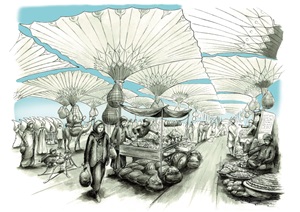 SciPhi Journal, Winter 2024/4
SciPhi Journal, Winter 2024/4
“The Ultimate Book” by Brett Abrahamsen
“Passover” by Robert L. Jones III
“Arcanum” by Gheorghe Sărsămand (translated by Monica Cure)
“Sacrificial Copy” by Tommy Blanchard
“The Red Goldfinch Proof” by Alexander P. Joy
“The Lazarus Serum” by Tony Hunter-Craig
“Another White Elephant” by Richard Lau
“Title Game” by Jeff Currier
“Requiem For The Light” by Amanda Cecilia Lang
Reviewed by Mina
A varied collection of thought experiments.
In “The Ultimate Book” by Brett Abrahamsen, the narrator wants to write the perfect book full of only perfect sentences. It’s an intellectual exercise written by an author who has likely been influenced by Borges’ short stories. A cautionary tale about seeking perfection as it can only lead to disillusionment.
“Passover” by Robert L. Jones III is a skit on religion, specifically a possible sighting of God. It also assigns a new meaning to “Passover” that is fun, as an unexplained (unexplainable?) phenomenon (“The Monad”) passes over Earth. The conclusion is that humankind will always reduce the unexplainable to a cheap gimmick. So, a tragedy?
“Arcanum” by Gheorghe Sărsămand, translated by Monica Cure, begins with the narrator finding himself in a fantastical city. Slowly, the tale builds up into one of the horrors of entrapment. How the reader interprets what exactly it means will be coloured by their experience. An insidiously uncomfortable tale.
It’s always nice to see the translator acknowledged as co-author.
“Sacrificial Copy” by Tommy Blanchard starts with a ship that needs to self-destruct to keep advanced scanning technology from enemy hands, but the scientist in charge of initiating self-destruction is afraid of death. What if they used the technology to create a copy of themselves to send back home? The twist at the end was predictable.
“The Red Goldfinch Proof” by Alexander P. Joy starts with scientists trying to breed a red goldfinch. They fail so a logician takes over. He also fails but, in so doing, he does catalogue the beauty of the world around him, suggesting a not entirely futile endeavour. If you find pure logic and philosophy trying, this story is not for you.
“The Lazarus Serum” by Tony Hunter-Craig postulates a world where resurrection in the flesh is possible. The undead become “second lifers” and go from becoming the oppressed minority to the ruling majority, showing how easily the oppressed can become the oppressor. The “blasphemous” last sentence echoes Borges’ “Three Versions of Judas”.
“Another White Elephant” by Richard Lau is a chat between Zeus and Prometheus. I liked that the author highlighted the fundamental cruelty and unfairness that has always put me off Greek mythology. The last line does full justice to the title.
In “Title Game” by Jeff Currier, a human plays a game with an AI. It seems to suggest that you simply can’t win against predictive AI. Vaguely amusing.
“Requiem For The Light” by Amanda Cecilia Lang is a requiem to Sol. As the star dies, it is visited by the descendants of those it once nurtured with its light. Perhaps there is no true death, just a step into beyond. I am not a fan of elegiac but it is well done.
Mina was tickled pink to be referred to as a “columnist” in this issue.